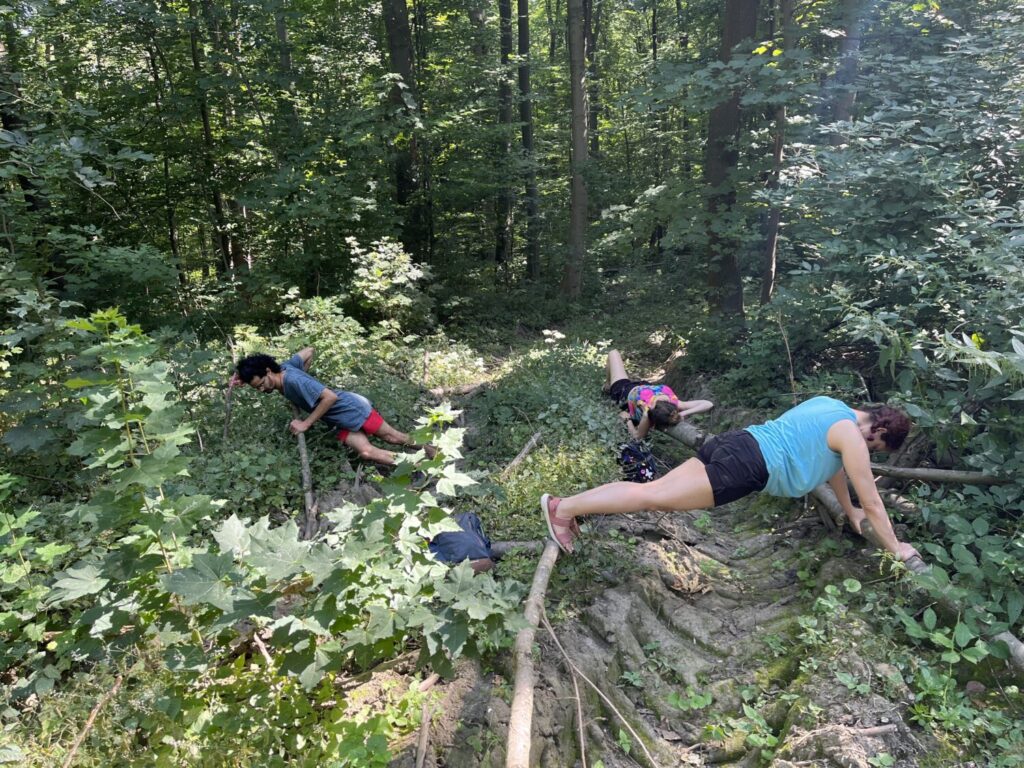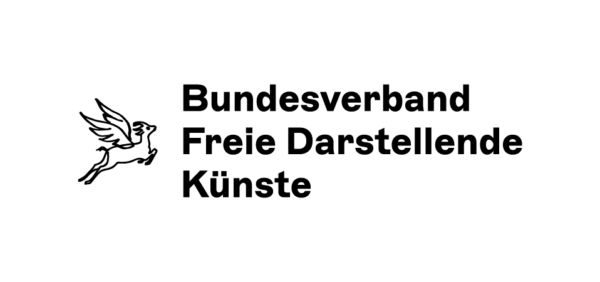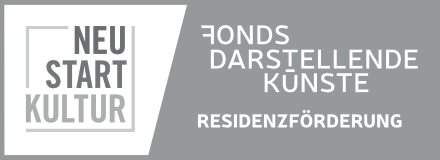
Felipe: Drei Menschen versuchen, die Todeserfahrung eines Wesens zu inszenieren, von dem sie nur Aspekte sind. Technisch gesehen gestalten sie jeweils Stimme, Körperlichkeit und Szenographie. Doch sind schon drei menschliche Körper anwesend, die auch Raum und Gegenstand sind, uns alles macht Geräusch. Es wird unklar, was mittels der Performer:innen dargestellt wird. Ob ihre jeweilige Tode? Diese Unklarheit mag prozessual betrachtet produktiv sein. Doch mangels eines mimetischen Gegenstandes (der Tod eines Wesens, aber welches? des Darms samt seiner Flora? Gaia? der kolonialen Geist und Länder?), kann die Sinnverleihung z.B. zu einem surrealistischen Akt der Künstler:innen schrumpeln.
Wie lassen sich Körper vor allem als Räumlichkeiten darstellen und ihre Wechselwirkungen wahrnehmbar machen? (# Kartographien und Anatomien des Kosmos)
In Anlehnung auf das Animationstheater (# Animismus und moderne/kolonisierte Sichtweise) kann eine Transfiguration der menschlichen Gestalt in eine von drei Performer:innen beweglich gemachte Kostüm-Szenographie gewebt, gestrickt, gebastelt werden. Oder: eine Laubblatt-Kostüm beweglich kraft des Windes.
Reicht das Medium Theater aus, mit seinem herkömmlichen Fokus auf den Anthropos und das Subjekt, um eine dezentrierte, ökologische, kosmische Dimension des Lebens aufzuzeigen? Gibt es eine mäßige Handlung dafür (# Aristoteles)?
This gift.
Around me holy protection. Skin that is openness. The principle in the ear.
That silence, feeling in me, in ending. Calcified words.
And this skin that is all wounds.
Bleeds, bleeds. And there’s not enough blood flowing
to make the fissure stem
between us.
the body there’s not.
… this silence.
Serafim
Terror of all this being nothing.
That inside an egg a hollow is twisted and breaks from itself to sprout similar to another being that is not even itself. And barely moving, it already walks and grows roots like feet of a wanderer who knows no fence, only edge, margin. Who errs for knowing
of lands and goes from passage to
aqua viva in this form of being movement
without state
only rest, caesura, silence. That dark night descends and travelling by starlight is an art of delicacy and strength. Precision of seclusion.
Only it is that will turn into flower. In new and old buds of stories heard many times. And lives, various.
It is from there that one marked by scar on legs sounds. And that of vase that listened to the rain falling into sea in each drop of waves and drop waves, particles of water shining infinitely indistinguishable diversities of being light. Rills. Through a groove it heard hollow.





Bárbara: Nach Dianas Proposition, in der wir mit dem Text “Decolonizing is not a metaphor” gearbeitet habe, hat mir die Frage, wie jemand zu einem Ort wird, die ganze Woche begleitet. Wenn wir unser Zuhause als unseren Körper verstehen, wie gestalte ich dieses Zuhause? Kann ich irgendwo anders gehen? Reisen und zurückkommen? Ist es möglich uns mit anderen Wesen zu verschmelzen, um unsere Körpergrenze auszudehnen?
Anhand dieser Fragen waren wir im Waldlabor unterwegs. Ein seltsamer Ort, wo Natur und Kultur sich treffen. Dort haben wir ausprobiert, unseren eigenen physischen Leib zu erkennen, mit Haut, Muskeln, Knochen und Flüssigkeiten zu erkennen. Dann versuchten wir uns mit dem anderen Wesen zu verbinden Bäume, Luft, Tieren, um da unsere Grenze deutlichen zu merken… Anhand der Frage, wie wird man/frau zu einem Ort, gestaltete jede*r den eigenen Nest in einem Nachbarschaft. Für mich ist der Bezug mit anderen Wesen und mit die verschiedene natürliche Qualitäten, Wasser, Luft, Feuer, Erde dringend.
Die Frage nach der Verschmelzung mit anderen Wesen bekam in der Woche immer mehr Platz. Die Improvisation rund um das Thema hat sehr gelingen. Wir bauten unsere Totenwache, in der jede*r einen Teil desselben Wesens war. Nach der Tod sollten wir reinkarnieren, aber diese Wiedergeburt könnte nur stattfinden, wenn wir unsere Beziehung zur Erde und zur anderen Wesen ändern würden. Für uns könnte es nur stattfinden, indem wir uns mit den anderen Wesen verschmelzen lassen. Raum wurde gebaut, es wurde gesungen, gesprochen und getanzt. Eine Installation des Sterbens und Wiedergeborens.
Olga: Wie sieht mein Nest aus und wie fühlt es sich an?
Ist es eine Erweiterung meines sichtbaren und unsichtbaren Körpers, meiner Energie, die sich im Raum ausbreitet? Welche Form hat es? Hat es eine Form?
Am Dienstag trafen wir uns im Wald, um zu sehen, wie sich die Haut des Körpers anfühlt, wenn sie mit verschiedenen Oberflächen und Texturen in Kontakt kommt. Je nach Kontakt hatte ich immer eine andere Vorstellung von der Form, Dichte, Textur und Dicke meiner Haut. Meine sichtbare Form fühlt sich also immer anders an, je nachdem, mit welchem Organismus oder mit welcher Fläche sie in Berührung kommt. Ich frage mich ob es bei den Menschen nicht ähnlich ist?
Das Außen macht die unsichtbaren Schichten um mich herum. Ich bin wie ein Kokon, geformt aus verschiedenen Schichten und Fäden, umgebaut, verwandelt… Ist mein Kokon auch ein Nest?
Gleichzeitig ist mein Körper ein Zuhause für die anderen Wesen, vielleicht bin ich ein Zuhause für die anderen Menschen, die auch mein Zuhause für mich sind? Die Verantwortung, die wir für unsere Nester tragen, ist also gleichzeitig die Verantwortung gegenüber den anderen. Aber wo sind die Grenzen meiner Empathie, meiner Anteilnahme?
Collective(?) practice and home- a question of permeable(?) borders
Diana: There is an expectation that we will work together as a collective and that tensions within the group can be productive and generative. I am also open and desiring to engage with generative conflict and generous sharing of research questions but this could not happen for me in the current working conditions of the group so I decided to change them, first and foremost, as an act of self-care.
[…]
——————————————————————————————————–
Offer of free storage space
-and search for an object to haunt the theatre-
Are you in a precarious living situation or homeless, and need storage space?
I can offer you limited storage space for a limited time for free.
I am an artist and was invited to work in the Werkstatt theater and they have a lot of space that I am not always using so I’d like to make it available to other people who could use the space.
You’ll also have the opportunity to exchange with me and maybe other artists about our work in the theatre and give us some ideas about how we could use the space there. This is an offer from my side but it’s not a must in order to get the storage space.
Also, contact me if you’d simply like that an object from your home would haunt the theatre space for a little while
Limited offer until 05.08.2022
[…]
—————————————————————————————————————-
if a “home” is not just a space we occupy but a time, what is the time of home?
When Augenweide, a homeless man, came to leave part of his “fleeting home”, that is, a shopping cart carrying more objects than one could ever imagine possible, he took his time to sort out the things that should stay in the theatre and the ones he needed to take with him. He had his own temporality, which I perceived as slow, and to which I tried to adapt with patience and a little resistance. I suppose it’s also a strategy for making himself at home, having us adapt to his temporality, and resisting being a disempowered victim, and recipient of our charity (which is not the purpose of this artistic research). Not only did Olga and I have to adapt to his temporality, but we also had to help him take out and move some of the stuff from his cart. Sometimes I couldn’t untie his strategic knots, didn’t understand his logic for classifying things, and was reluctant to put my hands in a bag not being able to see what kind of possibly “dirty” things I could come in contact with. It was testing my limits while reminding me of my bourgeois habits and expectations despite my ready-to-roll-over-the-”dirty”-ground artistic attitude and the I-welcome-sharing-and-contamination discourse. From whom and by what am I willing to be contaminated? On which kind of protected or unprotected space am I willing to roll over the dirty ground?
It struck me the fact of how easily he asks for and gets help, how easily he plays the role of the one in charge and slips out of the role of the helpless victim or undeserving outsider in which societal stereotypes often place homeless people.
He also took the time (and showed skills) to lift his shopping cart from the floor, where it had fallen, rearrange it and push it to the theatre with my help, while giving (or rather yelling) me directions and directives on how not to tip it over.
Thanks to an initial chance encounter with Hannah, he led a Tai Chi workshop at the playground. He was paid a fee of 40€. For a good part of the workshop, he sat down and so did we, he invited us to observe the trees during several 5-minute pauses. Our bodies had to adapt to his rhythm and posture and for the few moments that he stood up, I take it that he was also adapting to us. During the workshop, he asked Hannah to go buy him some wool socks and me to search for his bottle of water in the theatre and fill it up with water from the fountain. Making yourself at home has to do with changing your status from guest to host/owner, and that can be experienced by certain hosts as an invasion from their guests or a lowering of their hosts/owners’ status. I experienced it as a change/lowering of my status, which I welcome in a playful way, for I don’t consider myself to be entitled to a certain status but rather conceive status as roles that we play, disadvantages or privileges that we have and relations that are constantly renegotiated. He showed us the contingency of the status guest/host and a path to undo this apparent binary. Some of my colleagues expressed that offering to open some space in the theatre for the storage of his flüchtiges Zuhause felt like an invasion and an imposition (by me). Despite me having mentioned my intentions and having invited them to work with me on this proposition, and the fact that their rehearsal space remained untouched, they expressed not being prepared how to deal with the situation when a homeless person showed up at the building’s courtyard.
Gegen Ende der Woche gab es einen merkwürdigen Zufall, dass einen Obdachlosen sich entschieden hat, im Hof des Theaters zu wohnen. Wir beobachten, wie er seinen flüchtiges Zuhause baute und kamen mit ihm ins Gespräch.
Diana lud ihn ein, seine Sachen im Theater zu lagern und wir machten mit ihm einen Tai Chi Workshop. Hannah Ma ist auch gekommen, um mit uns zu sprechen und einen körperlichen Workshop zu leiten. Sie traf ihn als erstens und sprach mit ihm. Die Situation war Grund für Konflikten innerhalb der Gruppe. Wie weit geht das Leben ins Theater hinein? Wie weit dürfen wir unsere Residenz öffnen? Dürfen wir jemand anders einladen für einen Raum, wo wir selber Gäste sind? Gerne würden wir alle willkommen heißen, aber dürfen wir es im Raum des Theaters, also im Zuhause des Theaters, tun?
Das Treffen mit ihm war interessant, aber wie handeln wir es ethisch und transparent damit?
[…]



—————————————————————————————————————-
A home in the woods
[…]
create a nest or home in the woods and then invite one another into our homes. 4 radically different conceptions of home came about:







Nächste Woche will ich weiter die Frage der Verschmelzung untersuchen, Tieren beobachten und ein flüchtiges Zuhause in der Stadt bauen, wo ich im Bezug mit Passent*innen sein kann.
[…] = Edition by flausen

flausen+headquarters
Alexanderstraße 124
26121 Oldenburg
flausen+gGmbH
Klävemannstraße 16
26122 Oldenburg
Das überregionale Netzwerk flausen+ wird gefördert von der Beauftragten der Bundesregierung für Kultur und Medien über das Programm “Verbindungen fördern” des Bundesverbands Freie Darstellende Künste e.V.
Gefördert vom Fonds Darstellende Künste aus Mitteln der Beauftragten der Bundesregierung für Kultur und Medien im Rahmen von NEUSTART KULTUR.
Gefördert vom Fonds Darstellende Künste aus Mitteln der Beauftragten der Bundesregierung für Kultur und Medien.



